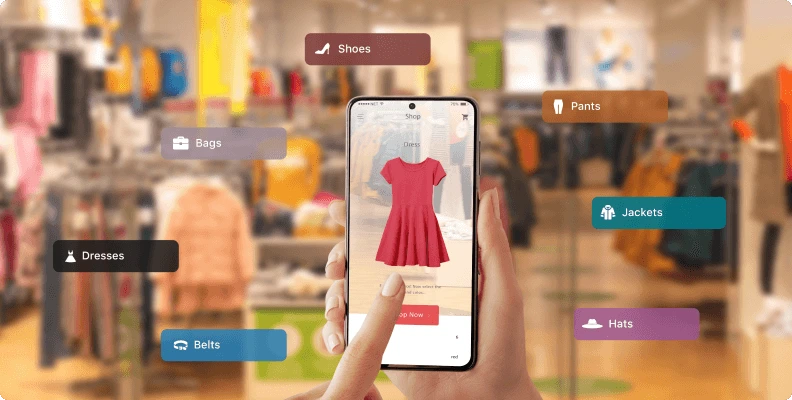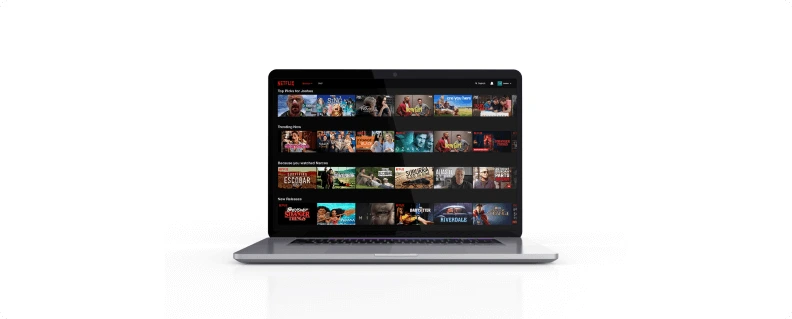Loading.....
Top 6 Emerging Retail Industry Technology Trends of 2023
In today's rapidly evolving retail landscape, staying competitive requires more than just offering quality products or services. It demands a keen understanding and integration of the latest retail industry trends. As technology continues to reshape the way consumers shop, connect, and engage with brands, retailers must adapt to survive and thrive in this digital age. In this blog, we will explore several essential retail technology trends that businesses should embrace to foster growth and long-term success.

Benefits Of Technology In The Retail Industry
1. Enhanced Customer Experience
Technology has significantly improved the overall shopping experience for consumers. Online shopping platforms and mobile apps offer convenience, enabling customers to browse, compare, and purchase products from the comfort of their homes. Personalized recommendations based on past purchases and preferences have become the norm, making shopping more enjoyable and efficient. In physical stores, technologies like digital kiosks and interactive displays engage customers, providing them with information and product details at their fingertips.
2. Inventory Management
One of the major challenges in the retail industry is maintaining optimal inventory levels. Technology in retail has brought forth inventory management systems that utilize data analytics and automation to optimize inventory control. This reduces the risk of overstocking or understocking, leading to cost savings and improved customer satisfaction. RFID technology, for instance, allows for real-time tracking of products, enhancing inventory accuracy.
3. Data-Driven Insights
Technology has provided retailers with access to a wealth of data. Analytics tools can process this data to gain insights into customer behavior, preferences, and buying patterns. Retailers can then use this information to make informed decisions, such as tailoring marketing strategies, optimizing product offerings, and even predicting future trends. In essence, data-driven insights help retailers stay competitive and adapt to changing market conditions.
4. Streamlined Operations
Automation and technology have streamlined various operational processes within the retail industry. Automated checkout systems, for instance, reduce waiting times for customers and free up staff to focus on more value-added tasks. Supply chain management has also been improved through technology, enabling retailers to track shipments, manage vendors, and ensure timely deliveries.
5. Enhanced Marketing and Promotion
Marketing in the digital age has become more sophisticated and targeted, thanks to technology. Retailers can leverage social media, email marketing, and search engine optimization (SEO) to reach a wider audience and promote their products effectively. With tools like customer relationship management (CRM) software, retailers can personalize marketing messages, increasing the likelihood of conversion.
6. Omnichannel Retailing
Technology has facilitated the rise of omnichannel retailing, where consumers can seamlessly switch between online and offline channels. This provides customers with greater flexibility and convenience. For retailers, it means that they can capture sales from multiple touchpoints, increasing revenue. Inventory visibility across all channels also ensures that customers can access products regardless of their location.
7. Improved Security
As the retail industry increasingly relies on digital transactions, security becomes paramount. Technology has introduced advanced security measures such as encryption, tokenization, and biometric authentication, ensuring the protection of sensitive customer data. Additionally, surveillance and monitoring systems help prevent theft and fraud in physical stores.
8. Sustainability
The retail industry has been making strides in sustainability, with technology playing a vital role in this endeavor. Retailers are adopting eco-friendly practices, such as energy-efficient lighting and heating systems, as well as digital receipts to reduce paper waste. Technology also aids in supply chain transparency, allowing consumers to make environmentally conscious choices by knowing the origins of products.
Top 6 Retail Technology Trends Of 2023

1. Artificial Intelligence (AI) and Machine Learning (ML)
AI and machine learning are revolutionizing the retail industry. These technologies enable retailers to analyze vast amounts of data to gain valuable insights into customer preferences, inventory management, and supply chain optimization.
AI and ML algorithms can analyze vast amounts of customer data to create personalized shopping experiences, while recommendation algorithms analyze purchase history to suggest tailored product options. Retailers like Netflix use AI to recommend products or content based on a user's past behavior and preferences.

Additionally, AI-driven demand forecasting adapts to market trends in real-time, ensuring that retailers can meet customer demands efficiently. These technological advancements not only streamline processes but also drive sales and customer satisfaction, making AI and Machine Learning invaluable tools in the dynamic retail industry trends of 2023.
2. Augmented Reality (AR) and Virtual Reality (VR)
AR and VR technologies are enhancing the in-store and online shopping experiences. AR allows customers to try on clothing virtually, visualize furniture in their homes, or see how makeup products look on their skin. VR can create immersive virtual showrooms, enabling customers to explore products in a more engaging way.
By integrating AR and VR into their strategies, retailers can differentiate themselves and provide unique value to consumers.
One notable example of automation leveraging AR and VR is Amazon. The e-commerce giant has integrated AR into its mobile app, allowing customers to visualize how products will look in their own homes before making a purchase. This feature not only reduces the uncertainty of online shopping but also streamlines the decision-making process.

Brands like Wanna Kick utilize AR in their apps, allowing customers to try on shoes virtually, saving time and improving the overall shopping experience.
On the other hand, Adidas employs VR for personalized shoe fitting. With the help of automated foot scanning technology, customers can find the perfect fit for their athletic shoes, reducing returns due to sizing issues.
3. Blockchain
Blockchain is a decentralized and immutable digital ledger that records transactions across a network of computers. Traditional retail systems rely on centralized databases and intermediaries, which can be vulnerable to cyberattacks and data breaches. Blockchain eliminates this vulnerability by decentralizing data across a network of computers, making it nearly impossible for a single point of failure.
Companies like IBM and Maersk have collaborated on TradeLens, a blockchain platform that simplifies global trade. Through TradeLens, all participants in the supply chain, from manufacturers to retailers, have access to a single, immutable ledger that records the journey of goods from factory to store. This transparency reduces the risk of fraud, errors, and delays, resulting in more efficient supply chains and cost savings that can be passed on to consumers.
This technology not only helps combat counterfeit products but also strengthens consumer trust. Additionally, blockchain can enhance loyalty programs by securely managing rewards points and tokens, creating a seamless and fraud-resistant loyalty experience.
4. Cashier-less Stores
Cashier-less stores are reshaping the way consumers shop and interact with brick-and-mortar stores. This innovative concept, often powered by cutting-edge automation technologies, eliminates the need for traditional cashiers and checkout lines, enhancing the overall shopping experience.
Leading the charge in this transformative trend is Amazon, with its Amazon Go stores.
These cashier-less outlets leverage a combination of computer vision, sensor fusion, and machine learning algorithms to allow customers to simply walk in, pick up the items they desire, and leave without ever having to stop at a cash register. The system automatically detects and charges the items in their virtual cart, streamlining the purchasing process and significantly reducing wait times.
5. Inventory Management Solutions
Effective inventory management is crucial for retailers to avoid overstocking or understocking products. Retail technology trends, such as RFID (Radio-Frequency Identification) and IoT (Internet of Things) devices, enable real-time tracking of inventory levels.
By providing real-time visibility into stock levels, these solutions empower businesses to make data-driven decisions, reducing the risk of overstocking or stockouts. Major brands like Walmart, Amazon, and Apple have been at the forefront of implementing these innovative solutions. For instance, Walmart utilizes RFID tags and QR codes to streamline its inventory tracking, ensuring that products are always readily available to meet customer demands.
This helps businesses streamline operations, reduce costs, and enhance customer satisfaction by ensuring products are always available when needed.
6. Voice Commerce and Smart Assistants
Voice-activated devices and smart assistants like Amazon Alexa and Google Assistant are changing how consumers shop. Leading players in the retail industry have embraced automation through voice-enabled technologies to enhance customer experiences and streamline operations.
For instance, Amazon's Alexa, one of the most prominent smart assistants, not only empowers consumers to make purchases using voice commands but also allows retailers to integrate voice technology into their applications, creating personalized shopping experiences.
Walmart has also leveraged automation by partnering with Google Assistant, enabling customers to add items to their online shopping carts using voice recognition. The integration of voice commerce and smart assistants is becoming increasingly crucial, propelling the industry toward a more efficient, customer-centric, and technologically advanced future.
Understanding Trending Retail Technology Adoption
The retail industry has undergone a seismic shift in recent years, driven by changing consumer preferences and the digital revolution. Consumers now expect seamless online and offline experiences, personalized recommendations, and easy access to product information. To meet these expectations and thrive in this competitive environment, retailers must leverage technology effectively. The right mix of technology can significantly impact a retailer's ability to attract, retain, and delight customers.
If you are planning to implement technology in your business, outsourcing is one of the best ways to start. Outsourcing allows you to tap into the expertise and specialized knowledge of technology providers. These experts are well-versed in the latest industry trends, emerging technologies, and best practices, ensuring that your retail tech solutions are cutting-edge and effective.
Drabito Technologies is a leading tech company that assists multiple startups worldwide in building successful trending retail technology tailored to meet your specific requirements, ensuring your growth effectively and efficiently.
Conclusion
In conclusion, the retail industry is undergoing a profound transformation driven by technological advancements. To stay competitive and foster growth, retailers must embrace these technology trends. Whether it's adopting omnichannel strategies, harnessing the power of AI and AR, or prioritizing data security and sustainability, staying ahead in the retail game means staying in sync with the latest technologies. By doing so, retailers can not only meet evolving customer expectations but also create a sustainable and prosperous future for their businesses.
 Back to blog
Back to blog













